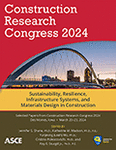Comparing Differences of Community Resilience and Rurality in the USA for Counties Prone to Riverine Flooding
Publication: Construction Research Congress 2024
ABSTRACT
This paper explores the variations in community resilience factors between rural and urban counties across the US, focusing on regions at relatively high risk of riverine flooding. Leveraging data from the FEMA National Risk Index, US Census Bureau, and BRIC Community Resilience Index, the study explores the relationship between community resilience and the degree of rurality. The analysis identifies statistically significant differences between urban and rural counties and identifies the extent of Spearman’s correlation between each factor and percent rural. Rural counties facing elevated riverine flood risks exhibit comparatively lower community resilience in social, economic, and infrastructure/housing. Conversely, urban counties have a lower resilience in community and environmental aspects. These are more pronounced than seen nationally; while the directions of the trends nationally are similar, the correlations differ in magnitude. Notably, these higher-risk rural counties have a greater need for infrastructure/housing resilience (ρih = –0.78) and have a greater level of community and environmental resilience than their higher-risk urban counterparts (ρc = 0.47; ρe = 0.52) as compared generally in the US (ρih = –0.49; ρc = 0.30; ρe = 0.34). This study contributes to resilience literature by identifying aspects of community resilience within high-risk riverine flood-prone areas that are unique compared with the general urban/rural dynamics in the US.
Get full access to this article
View all available purchase options and get full access to this chapter.
REFERENCES
Ahmadi, S. Y., J. I. Lather, C. E. Wittich, and K. Madson. 2023. “Investigating the Data Inputs and Requirements for Response and Recovery Decision Models in Flooding Events.” ASCE Computing in Civil Engineering Conference. June 25-28, Corvallis, OR, USA.
Ahmadi, S. Y., G. Y. González, C. E. Wittich, and J. I. Lather. 2023. “Driving Factors of Rural Social Vulnerability for Communities at High Risk of Riverine Flooding in the United States.” ASCE INSPIRE Conference, November 16-18, Arlington, VA, USA.
Borden, K. A., M. C. Schmidtlein, C. T. Emrich, W. W. Piegorsch, and S. L. Cutter. 2007. “Vulnerability of U.S. cities to environmental hazards.” Journal of Homeland Security and Emergency Management, 4 (2).
Bruneau, M., S. E. Chang, R. T. Eguchi, G. C. Lee, T. D. O’Rourke, A. M. Reinhorn, M. Shinozuka, K. Tierney, W. A. Wallace, and D. Von Winterfeldt. 2003. “A Framework to Quantitatively Assess and Enhance the Seismic Resilience of Communities.” Earthquake Spectra, 19 (4): 733–752.
Chuang, W. C., et al. 2018. “Enhancing quantitative approaches for assessing community resilience.” Journal of Environmental Management, 213: 353–362.
Cumming, G. S., G. Barnes, S. Perz, M. Schmink, K. E. Sieving, J. Southworth, M. Binford, R. D. Holt, C. Stickler, and T. Van Holt. 2005. “An Exploratory Framework for the Empirical Measurement of Resilience.” Ecosystems, 8 (8): 975–987.
Cutter, S. L., K. D. Ash, and C. T. Emrich. 2016. “Urban–Rural Differences in Disaster Resilience.” Annals of the American Association of Geographers, 106 (6): 1236–1252.
Cutter, S. L., K. D. Ash, and C. T. Emrich. 2014. “The geographies of community disaster resilience.” Global Environmental Change, 29: 65–77.
Cutter, S. L., L. Barnes, M. Berry, C. Burton, E. Evans, E. Tate, and J. Webb. 2008. “A place-based model for understanding community resilience to natural disasters.” Global Environmental Change, 18 (4): 598–606.
FEMA. 2022. “National Risk Index” FEMA, <https://www.hazards.fema.gov/nri≥ (Apr. 20, 2023).
Gunderson, L., and C. S. Holling. 2001. Panarchy: Understanding Transformations In Human Natural Systems. Island Press, Washington, DC.
“HVRI BRIC Data - College of Arts and Sciences | University of South Carolina.” <https://sc.edu/study/colleges_schools/artsandsciences/centers_and_institutes/hvri/data_and_resources/bric/bric_data/index.php> (Apr. 20, 2023).
Leichenko, R. 2011. “Climate change and urban resilience.” Current Opinion in Environmental Sustainability, 3 (3): 164.
National Academy of Sciences. Disaster Resilience: A National Imperative., Washington DC, USA, 2012.
NIST, and IN-CORE. 2021. “Center of Excellence & IN-CORE.” NIST. <https://www.nist.gov/community-resilience/center-excellence> (Aug. 03, 2023).
Rapaport, C., T. Hornik-Lurie, O. Cohen, M. Lahad, D. Leykin, and L. Aharonson-Daniel. 2018. “The relationship between community type and community resilience.” International Journal of Disaster Risk Reduction, 31: 470–477.
Saravi, S., R. Kalawsky, D. Joannou, M. Rivas Casado, G. Fu, and F. Meng. 2019. “Use of Artificial Intelligence to Improve Resilience and Preparedness Against Adverse Flood Events.” Water, 11 (5): 973.
Subcommittee on Disaster Reduction. 2005. Grand Challenges for Disaster Reduction. National Science and Technology Council, Washington, DC.
Tierney, K., and M. Bruneau. 2007. Conceptualizing and measuring resilience: A key to disaster loss reduction. Scopus.
US Census Bureau. 2015. “Urban and Rural.” Census.gov. <https://www.census.gov/programs-surveys/geography/guidance/geo-areas/urban-rural.html≥ (Apr. 20, 2023).
Vale, E. L. J., and T. J. Campanella, eds. 2005. The Resilient City: How Modern Cities Recover from Disaster. Oxford, New York.
Wilkin, J., E. Biggs, and A. J. Tatem. 2019. “Measurement of Social Networks for Innovation within Community Disaster Resilience.” Sustainability, 11 (7): 1943.
Zhong, M., K. Lin, G. Tang, Q. Zhang, Y. Hong, and X. Chen. 2020. “A Framework to Evaluate Community Resilience to Urban Floods: A Case Study in Three Communities.” Sustainability, 12 (4): 1521.
Information & Authors
Information
Published In
History
Published online: Mar 18, 2024
Authors
Metrics & Citations
Metrics
Citations
Download citation
If you have the appropriate software installed, you can download article citation data to the citation manager of your choice. Simply select your manager software from the list below and click Download.
